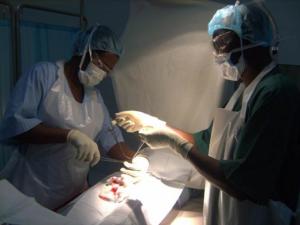Training medical doctors on Voluntary Medical Male Circumcision (VMMC) to strengthen NHI districts in South Africa
Pretoria, August 2015 - The WHO Country Office is providing technical support to the National Department of Health on various aspects of VMMC with support from the US Government through PEPFAR to be able to meet the ambitious Medical Male Circumcision (MMC) targets by 2016.
As part of a scale up plan for VMMC, the National Department of Health is systematically increasing the pool of doctors who can assist in performing medical circumcisions in adult and adolescent males, prioritising the National Health Insurance (NHI) districts. WHO is currently supporting the Department of Health to train medical doctors on surgical MMC using the forceps-guided and the dorsal slit methods under local anaesthesia.
Two service providers, JHPEIGO and CHAPS, have been contracted to support this. To date, 50 doctors have already been trained in Gauteng and Mpumalanga Provinces. These doctors are contracted to NHI facilities and through this training, they will be able to extend the MMC services within the same facilities. This initiative has been supported financially by CDC South Africa. NDOH is planning to train approximately 550 general practitioners in all the NHI districts before extending it to other doctors.
South Africa’ national programme on MMC (the surgical removal of the foreskin from the penis by trained medical personnel under aseptic conditions) started in 2010. By the end of 2014, almost 2 million circumcisions had been performed, accounting for about 43% of the 2016 target of 4.3 million. The aim is to reduce men’s overall HIV prevalence to the extent that there is a population-wide or “herd” effect which will then limit transmission from men to women.
South Africa has aligned itself with the new global 90–90–90 targets, which call for 90% of all people with HIV to be diagnosed, 90% of eligible people with diagnosed HIV to receive Antiretroviral Therapy (ART) and 90% of those on ART to have a suppressed viral load by 2020. The VMMC programme has ensured that all clients presenting for MMC are offered HIV counselling and testing, which contributes to the first 90%. The programme also ensures that those that are HIV infected are linked to appropriate HIV care for further management and ART initiation.
Recent modeling studies have shown that for programmatic efficiency in South Africa, prioritising males aged 20-35 followed by those aged 15-19 can lead to more efficient use of programme resources. The training of doctors on MMC has incorporated the understanding of the broader HIV treatment cascade and how MMC programme can support linkages and improve retention in care. MMC remains a unique opportunity to link men with relevant health care services such as HIV testing and sexually transmitted infections.
